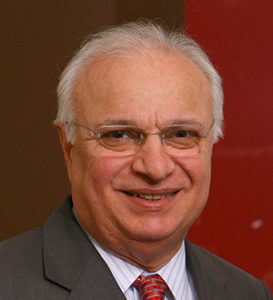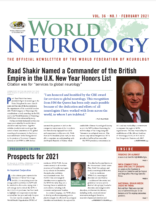Citation was for “services to global neurology”
Commentary on the CBE Award for Prof. Raad Shakir by WFN President William M. Carroll
 Prof. Raad Shakir has been a prominent figure in neurology in the United Kingdom for more than 20 years and was one of the key persons in the organization of the successful London 2001 World Congress of Neurology. His contributions to both neurology in the U.K. and to the World Federation of Neurology (WFN) have been witnessed by many.
Prof. Raad Shakir has been a prominent figure in neurology in the United Kingdom for more than 20 years and was one of the key persons in the organization of the successful London 2001 World Congress of Neurology. His contributions to both neurology in the U.K. and to the World Federation of Neurology (WFN) have been witnessed by many.
He has provided dedicated service over many years aided by his multicultural education and experience. Together with his detailed understanding of the varied cultural sensitivities in the global neurological community, he has been a successful leader. Before being elected to the position of Secretary-Treasurer General of the WFN in 2009, he had assumed this position in 2007 on the unexpected retirement of the incumbent. He immediately displayed these skills and commitment in this new role. With then-WFN President Johan Aarli, he was able to negotiate an understanding with the Peoples Republic of China, which enabled the Chinese Neurological Society to join the WFN without fracturing the memberships of the Hong Kong and Taiwanese neurological societies. This was no easy task as two previous WFN presidents had been less successful.
His WFN presidency commenced in 2014 and was marked by a commitment to empower the regional WFN organizations. This was crowned by the establishment of the African Academy of Neurology (AFAN) in 2015 and its first Congress in Tunis in early 2017. Although Dr. Shakir did not instigate the WFN African initiative in 2006, there is no doubt his enthusiasm at the time and his subsequent leadership enabled the initiative to be transformed into the AFAN and for AFAN to take its place as an active regional affiliated WFN organization.
As WFN President, Dr. Shakir also led WFN support for the African initiative to develop two neurological training centers each in both Anglophone and Francophone Africa. An early limitation was the funding of these centers. Through his energy, enduring funding was established to the benefit of neurology in Africa. Such an outcome both freed up valuable WFN funds for additional educational projects and elevated the visibility and support for the WFN. The benefit of WFN’s increased recognition as leader in neurological education in one of the most difficult yet needful areas of the world will pay dividends for many years through elevating the standard of neurological care in Africa.
The development and establishment of the Pan American Federation of Neurological Societies also occurred in Latin America during Dr. Shakir’s presidency. His influence and guidance were fundamental in driving this successful outcome.
Dr. Shakir displayed the same dedication and skill in WFN dealings with the World Health Organization (WHO). Intimate involvement with WHO-related activities such as the Neurology Atlas of 2017 and in heading the neurology Topic Advisory Group for the revision of the International Classification of Diseases (ICD-11) required enormous effort, patience, and skill over a considerable period of time.
The WFN and the global neurological and stroke communities are indebted to Dr. Shakir for his efforts. The interaction between the WFN and the WHO has led to a fundamental change in the way the WHO now views stroke (as a disease of the brain) and in the classification of neurological diseases in ICD-11. Both will be advantageous to the promotion of neurological care worldwide, and both are a direct result of his inspirational leadership and the respect in which he is held by all.
He is a worthy recipient of this prestigious award. •
